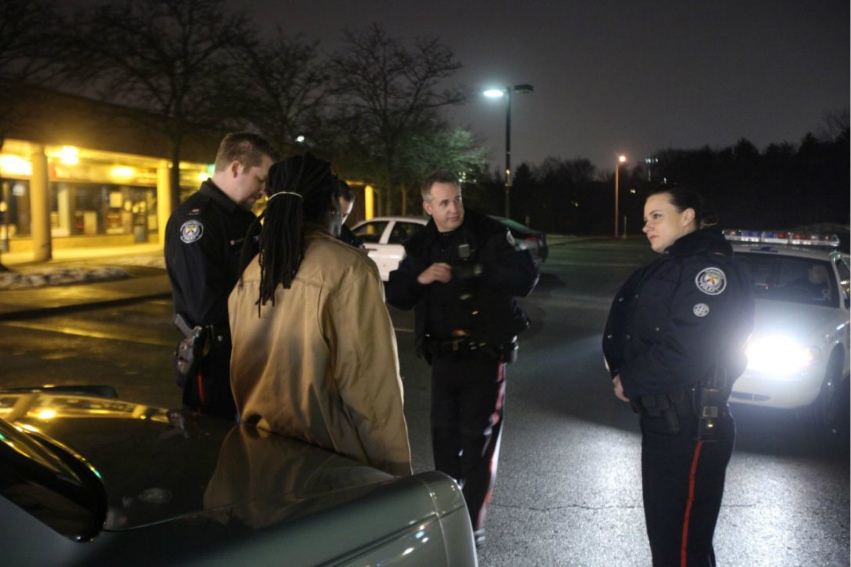KJIPUKTUK (Halifax) – RCMP police behaviour is every bit as racist in rural HRM as its Halifax Regional Police counterpart in urban Halifax. That was the consensus among the thirty or so mostly older residents of the historic African Nova Scotian communities of Lucasville and Upper Hammonds Plains who attended last night’s meeting about carding and police attitudes in general at the Lucasville Community Centre.
The community meeting was organized by the Nova Scotia Human Rights Commission. In attendance was Scott Wortley, the Ontario criminology professor who was asked to make recommendations on street checks to Halifax Council.
All this was set in motion after a Freedom of Information request revealed that Black people are disproportionately subjected to these kinds of stops, and after Black community members in a letter asked for an immediate moratorium on the practice.
To protect people’s privacy journalists were not allowed to make recordings, and the people who spoke out cannot be identified.
Let me start with a personal observation. I live in Upper Sackville, 10 minutes down the road from Lucasville. I have lived here for thirty years or so. During those thirty years police pulled me over once. A polite police officer apologized profusely when it became clear I had done nothing wrong.
That’s not the experience of Black residents of Lucasville and Upper Hammonds Plains. When asked last night, they landed on an estimated 4 to 5 traffic stops per year. All mentioned how rude cops are during these interactions, and how over the top their behaviour.
Needless to say, I am white. People in Lucasville and Upper Hammonds Plains are Black.
Much like the meeting in the Halifax North End, people expressed frustration with the entire analysis that Dr. Wortley is conducting.
I am tired of this shit, one person told Wortley. It’s always the same, I am past these perpetual reports. This is a futile process we go through every eight years or so. We have nothing to show for it for the last thirty years. As well, I am resentful that you as a white man from Ontario are here, as if we don’t have our own Black experts in Nova Scotia, he added.
Wortley didn’t disagree, but argued that solid data and recommendations may well convince what he described as the many white fence sitters on the issue.
Here are some stories people told, for the benefit of these white fence sitters.
I was pulled over for using a cell phone. The cop was screaming. It was an ice pack. Why be so rude?
My husband is Black, he parked in the church parking lot waiting for me to come out, and then he fell asleep. Next thing he knows, there are two cop cars, flashing lights, and cops shining light in his eyes. He didn’t know what to do.
A woman was using the WiFI in the parking lot of an Upper Hammonds Plains church. All of a sudden two cop car pull in, with flashing lights. Why?
I see a lot of ignorant Halifax police needlessly bothering our Black youths. RCMP as well.
The mandatory use of body cams, and an ombudsman-like organization with a Black community representation were offered up as partial solutions by the attendants. People also talked about the need for politicians with backbone.
Police diversity training was mostly seen as window dressing, especially when conducted by internal resources and without accountability.
Steve Craig, councillor, and chair of the Board of Police Commissioners, towards the end, mentioned how rough it was for him to hear these stories, and that he sensed people’s anger. Craig promised that he would follow up on the recommendations from Dr. Wortley, when his report is completed. Wortley has not yet committed to a timeline, and the entire investigation was extremely slow coming out of the starting gates.
When asked why he did not favour the moratorium that the community asked for, Craig merely responded that he was waiting for the Wortley report, and that he expects it to be thorough, with realistic actionable recommendations.
See also: It’s called carding and it should stop entirely
If you can, please support the Nova Scotia Advocate so that it can continue to cover issues such as poverty, racism, exclusion, workers’ rights and the environment in Nova Scotia. A paywall is not an option, since it would exclude many readers who don’t have any disposable income at all. We rely entirely on one-time donations and a tiny but mighty group of dedicated monthly sustainers.




